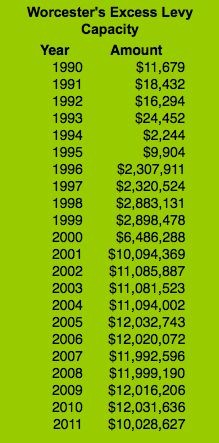A $10 Million Solution for Worcester’s Budget Gap
Monday, April 23, 2012

GoLocalWorcester spoke to the Mayor’s Office, City Councilors and residents, all of whom opposed a tax increase.
City Councilors Against Increasing Taxes
City Councilor Tony Economou recommended that the city manager identify cost savings in the budget instead of raising taxes. “Right now my feeling is not to raise taxes. I’d like to see the city manager find cost savings before we raise taxes. I don’t think any department can afford layoffs.”
City Councilor Konstantina B. Lukes said she opposed the idea of raising taxes to balance the budget.
“I’ve opposed it in the past, and I still am against it,” Lukes said. “We are facing increased water and sewer rates, and we’re going through the revaluation, which is going to create an additional financial burden.
“Given the cost of energy and the downturn in the economy, I can’t justify putting an additional burden on the taxpayers,” she said.
Mayor Joseph Petty is also opposed to a tax hike.
Being fiscally responsible and prudent with the tax payer’s monies is something I take very seriously,” he sent in an email to GoLocalWorcester. “Working with my colleagues on the City Council and the administration we have been able to build the unused levy capacity to about $10 million. Any discussion about reducing the excess levy capacity must be taken without haste and with input from the public and for reasons unrelated to balancing the budget.
Worcester residents were also against the idea of higher property taxes.
“I don’t want them to raise taxes,” lifelong resident Judy Martin said. “But we don’t need any layoffs, either.”
“It all depends on what they’re going to cut,” Sandy Abrahamian said. “They shouldn’t cut mental health services or services for the elderly.”
Excess Capacity Defined
While raising taxes is never a popular solution, it is a possible solution to the city’s budget shortfall. Because the city has not taxed its residents at the maximum allowable amounts under Proposition 2 ½, it has excess levy capacity.
Excess levy capacity is the difference between the total amount assessed in real estate taxes and the amount the city is permitted to charge. State law limits the amount of property tax increases to 2 ½ percent of the prior year levy amount, plus any new growth.
New growth comes from property taxes on new construction and/or additions.
Cities and towns that do not tax to their full levy limit build excess capacity. Excess capacity is cumulative, and with a simple majority vote by the city council, the property tax levy can increase without a Proposition 2 ½ override vote.
Bond rating agencies view excess capacity favorably and authorize lower interest rates for municipalities with excess capacity.

Worcester’s Capacity

The city’s excess capacity, which was practically nothing 20 years ago, hit $2 million in 1996, and bumped up again in 2000 to $6.4 million. Excess capacity exceeded $10 million for the first time in 2001, and grew to $12 million in 2005, and remained at that level until 2011, when $2 million was used.
Michael Lanava, spokesman for the Mayor Joseph Petty, said the $2 million used in 2011 was not used to balance the budget, but instead to fix a backlog of street and sidewalk repairs.
“Residents had petitioned the City Council and the streets were placed on the approved location list. The streets that were petitioned by the residents and were on the approved list had been awaiting funding and these funds were used for that purpose after public input,” Petty said in an email to GoLocalWorcester.
Excess capacity figures for fiscal 2012, which are available for most cities and towns, are not yet available for Worcester, since the tax rate has not yet been set.
Worcester’s fiscal 2011 tax rate was $16.06 for residential and $34.65 for commercial properties. The 2012 tax rates have not yet been set due to a delay in the revaluation of the city’s properties.
Other Cities and Towns
Worcester’s $10 million is the state’s fourth largest amount of capacity, with only Cambridge ($99 million), Marlborough ($19.9 million) and Quincy ($17.2 million) having set aside more capacity in fiscal 2011.
As a percentage of levy capacity however, the city is 40th.
Other local towns with a large amount of excess capacity are: Leominster ($5.2 million), Sterling ($1.2 million), Westminster ($925,000) and Stow ($910,000).
Related Articles
- NEW: House Budget Proposal Would Give Worcester An Extra $1.9M
- City Retiree Health Costs Crippling Worcester
- How Worcester Loses Out on $20 Million in Property Taxes Annually
- Local Aid Bump Won’t Close Central Mass Budget Gaps




 Delivered Free Every
Delivered Free Every
Follow us on Pinterest Google + Facebook Twitter See It Read It